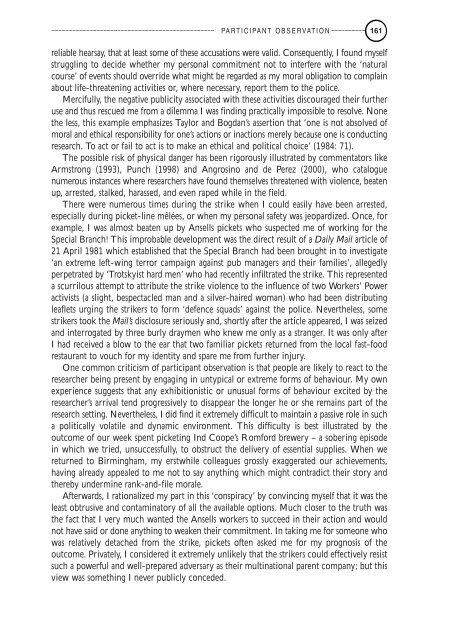essential-guide-to-qualitative-in-organizational-research
essential-guide-to-qualitative-in-organizational-research
essential-guide-to-qualitative-in-organizational-research
- No tags were found...
You also want an ePaper? Increase the reach of your titles
YUMPU automatically turns print PDFs into web optimized ePapers that Google loves.
––––––––––––––––––––––––––––––––––––––––––––––– PARTICIPANT OBSERVATION–––––––––– 161reliable hearsay, that at least some of these accusations were valid. Consequently, I found myselfstruggl<strong>in</strong>g <strong>to</strong> decide whether my personal commitment not <strong>to</strong> <strong>in</strong>terfere with the ‘naturalcourse’ of events should override what might be regarded as my moral obligation <strong>to</strong> compla<strong>in</strong>about life-threaten<strong>in</strong>g activities or, where necessary, report them <strong>to</strong> the police.Mercifully, the negative publicity associated with these activities discouraged their furtheruse and thus rescued me from a dilemma I was f<strong>in</strong>d<strong>in</strong>g practically impossible <strong>to</strong> resolve. Nonethe less, this example emphasizes Taylor and Bogdan’s assertion that ‘one is not absolved ofmoral and ethical responsibility for one’s actions or <strong>in</strong>actions merely because one is conduct<strong>in</strong>g<strong>research</strong>. To act or fail <strong>to</strong> act is <strong>to</strong> make an ethical and political choice’ (1984: 71).The possible risk of physical danger has been rigorously illustrated by commenta<strong>to</strong>rs likeArmstrong (1993), Punch (1998) and Angros<strong>in</strong>o and de Perez (2000), who cataloguenumerous <strong>in</strong>stances where <strong>research</strong>ers have found themselves threatened with violence, beatenup, arrested, stalked, harassed, and even raped while <strong>in</strong> the field.There were numerous times dur<strong>in</strong>g the strike when I could easily have been arrested,especially dur<strong>in</strong>g picket-l<strong>in</strong>e mêlées, or when my personal safety was jeopardized. Once, forexample, I was almost beaten up by Ansells pickets who suspected me of work<strong>in</strong>g for theSpecial Branch! This improbable development was the direct result of a Daily Mail article of21 April 1981 which established that the Special Branch had been brought <strong>in</strong> <strong>to</strong> <strong>in</strong>vestigate‘an extreme left-w<strong>in</strong>g terror campaign aga<strong>in</strong>st pub managers and their families’, allegedlyperpetrated by ‘Trotskyist hard men’ who had recently <strong>in</strong>filtrated the strike. This representeda scurrilous attempt <strong>to</strong> attribute the strike violence <strong>to</strong> the <strong>in</strong>fluence of two Workers’ Poweractivists (a slight, bespectacled man and a silver-haired woman) who had been distribut<strong>in</strong>gleaflets urg<strong>in</strong>g the strikers <strong>to</strong> form ‘defence squads’ aga<strong>in</strong>st the police. Nevertheless, somestrikers <strong>to</strong>ok the Mail’s disclosure seriously and, shortly after the article appeared, I was seizedand <strong>in</strong>terrogated by three burly draymen who knew me only as a stranger. It was only afterI had received a blow <strong>to</strong> the ear that two familiar pickets returned from the local fast-foodrestaurant <strong>to</strong> vouch for my identity and spare me from further <strong>in</strong>jury.One common criticism of participant observation is that people are likely <strong>to</strong> react <strong>to</strong> the<strong>research</strong>er be<strong>in</strong>g present by engag<strong>in</strong>g <strong>in</strong> untypical or extreme forms of behaviour. My ownexperience suggests that any exhibitionistic or unusual forms of behaviour excited by the<strong>research</strong>er’s arrival tend progressively <strong>to</strong> disappear the longer he or she rema<strong>in</strong>s part of the<strong>research</strong> sett<strong>in</strong>g. Nevertheless, I did f<strong>in</strong>d it extremely difficult <strong>to</strong> ma<strong>in</strong>ta<strong>in</strong> a passive role <strong>in</strong> sucha politically volatile and dynamic environment. This difficulty is best illustrated by theoutcome of our week spent picket<strong>in</strong>g Ind Coope’s Romford brewery – a sober<strong>in</strong>g episode<strong>in</strong> which we tried, unsuccessfully, <strong>to</strong> obstruct the delivery of <strong>essential</strong> supplies. When wereturned <strong>to</strong> Birm<strong>in</strong>gham, my erstwhile colleagues grossly exaggerated our achievements,hav<strong>in</strong>g already appealed <strong>to</strong> me not <strong>to</strong> say anyth<strong>in</strong>g which might contradict their s<strong>to</strong>ry andthereby underm<strong>in</strong>e rank-and-file morale.Afterwards, I rationalized my part <strong>in</strong> this ‘conspiracy’ by conv<strong>in</strong>c<strong>in</strong>g myself that it was theleast obtrusive and contam<strong>in</strong>a<strong>to</strong>ry of all the available options. Much closer <strong>to</strong> the truth wasthe fact that I very much wanted the Ansells workers <strong>to</strong> succeed <strong>in</strong> their action and wouldnot have said or done anyth<strong>in</strong>g <strong>to</strong> weaken their commitment. In tak<strong>in</strong>g me for someone whowas relatively detached from the strike, pickets often asked me for my prognosis of theoutcome. Privately, I considered it extremely unlikely that the strikers could effectively resistsuch a powerful and well-prepared adversary as their mult<strong>in</strong>ational parent company; but thisview was someth<strong>in</strong>g I never publicly conceded.



